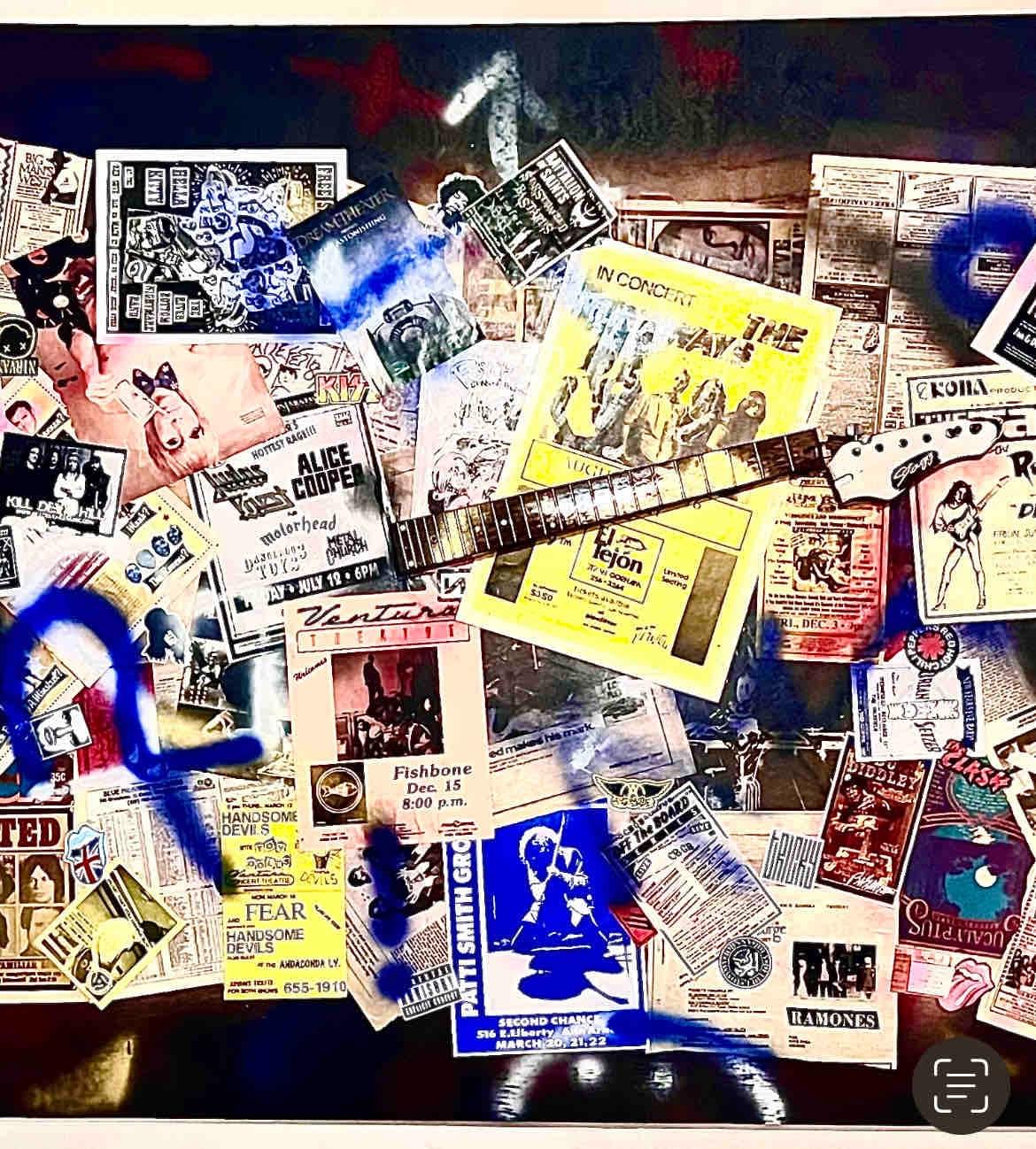



"This is clearly a writer to be watched...and read." -Brian F. Keane, author, "Green is Good"



"This is clearly a writer to be watched...and read." -Brian F. Keane, author, "Green is Good"


The Acclaimed Author of "Paper Dolls of the East,” "The House at the End of the World," The Death of Xavier,” and Other Stories.
Guitarist for the Supergroup, “Bad Penny.”
Visual Artist.
Director and Producer of the feature documentary "Brothers"
Mike Holtzman
Stories & News
Mike Holtzman is the founder, guitarist, and primary songwriter for Bad Penny, a rock mega-group featuring Rob Halford of Judas Priest, metal legend Dee Snider, Cheap Trick's Robin Zander, Living Colour’s Corey Glover, former Journey lead singer Steve Augeri, and Queensryche lead vocalist Todd LaTorre. In addition to Mike Holtzman, the band features former Queen + Paul Rodgers bassist Danny Miranda, Blue Oyster Cult drummer Jules Radino, producer/arranger/ guitarist Tony Bruno and others. Visit the band’s official website: www.badpennyband.com for more.
# # #
Mike Holtzman's Harrowing Story "The House at the End of the World," is Published in the Spring 2020 Issue of Solstice Literary Magazine! Read it: https://solsticelitmag.org/content/the-house-at-the-end-of-the-world/
"I am so taken with this story, with the language, with the prose poetry, and the moving way Holtzman depicts the flood," said Solstice Editor-in-Chief Lee Hope Betcher. "I love the range he shows in his work."
“Mike Holtzman brings us a story not just for our time….but for all time. Relevant, passionate and accessible story-telling that tackles head-on some of today’s biggest challenges – race and climate change. This is clearly a writer to be watched….and read.” -Brian F. Keane, Author, “Green is Good”
###
Mike Holtzman's Award-winning Short-Story, "Paper Dolls of the East,” is Published in the Summer 2019 Issue of Solstice; Moving Tale of Syrian Refugees Also Named a Finalist for the Tucson Festival of Books' Literature Prize and Wins Accolades from Lorian Hemingway and Glimmer Train!
Man Booker Prize Winner Paul Beatty selected Mike Holtzman's latest short story, "Paper Dolls of the East," for the summer 2019 issue of the literary magazine Solstice, and awarded it one of the magazine's highest honors in its annual literary competition. Describing the harrowing tale of Syrian refugees, Beatty said, "Mike uses fragments to reveal a Syrian refugee camp at the Lebanese border and the painful choice a mother makes to sell one daughter as a sex slave in order to save another daughter who is handicapped. TRULY UNFORGETTABLE."
"Paper Dolls of the East" was also named a Finalist for the Tucson Festival of Books' Literature Prize. The well-received story has also received "Honorable Mentions" from Lorian Hemingway and by Glimmer Train, one of the most prominent American journals for art and literature.
"The girl peers through a hole in the sun-bleached blue polythene wrap that doesn’t do much to keep out the rain and the cold which come more often in this squalid valley than they did back home just over the mountains. Those jagged peaks once three days beneath her feet are now two days walk behind her, a forbidding ridge at the edge of camp that splits her life in two uneven parts one teeming with the simple delights and rituals of childhood, the other littered with despair that collects spoils and spreads under thousands of flimsy tents pitched across an unwanted patch of useless landscape." --from Mike Holtzman's "Paper Dolls of the East"
Read it Here!
Mike Holtzman's "The Death of Xavier" Awarded Honourable Mention by Grain Magazine!
Grain Magazine, the Canada-based literary journal, awarded Mike Holtzman an “Honourable Mention” for his 2018 short story entry, “The Death of Xavier.” The humorous roman-a-clef represents Mike’s debut as a fiction writer. The distinction was announced in Grain’s fall issue.
Based in Paris, “The Death of Xavier” is the hilarious tale of a missing American who may or may not be dead, as told from the perspective of a nosy, elderly neighbor. “I am sure that Xavier was heroic in the end, gored by a bull in Pamplona or a love rival in St. Denis. Francois says I am jumping to conclusions and it could be simply that Xavier was hit by a bus.”
Read the whole story below!

The author’s former home on Rue St. Antoine, Paris.
"The Death of Xavier"
Consul General of the United States
Avenue Gabriel
Paris, France
Re: Statement on the Certain Death of an American Citizen Abroad
To Whom It May Concern:
I am writing to report the certain death of our upstairs neighbor, Xavier. Xavier wasn't his real name. It was Bob or Mark or another of those boring American names. Alors, he is dead. My husband Francois and I are sure of this and we are at your service in your investigation which must begin tout de suite.
We did not see Xavier much around the building these past few months, though we heard him from time to time, usually at night when we were awoken by the dreadful buzz of his passkey. It was as if someone was being electrocuted in the vestibule. Were it only the Vietnamese delivery men dumping menus in the entry who were being zapped! Alors, then came the clapping of Xavier’s shoes as he made his way around the steps past our door to his flat on the 3eme etage, where he would disappear during his short and mysterious visits.
Before I met him I hated him because he used his flat as a pied-a-terre. To us, Number 64 Rue de Rivoli is more than a place to put one’s feet up. It is home. My husband and I have lived here for 53 years and not once did we ever put our feet up. We bought the apartment on the first floor of the building in the winter of 1958, long before the neighborhood was overrun with foreigners and gay men. Our arrondissement is known as Le Marais, the one corner of Paris that Georges Haussmann did not touch when Napoleon III had him knocking everything else down to make room for the Prussians, the Communards, the Germans, the students, and anyone else who needed wide boulevards to ransack our city. Fortunately, Baron Haussmann died before he could demolish our quartier, which still has l’air of medieval Paris with buildings like ours that stoop like crooked old men over narrow, winding streets paved with cobblestones unlike other parts of Paris where the stones had been ripped up by anarchists who hurled them from rooftops onto the heads of soldiers and policemen before the authorities sealed everything in tar.
In 1966, after Mr. Aboute died in hospital from kidney stones and all his yelling upstairs finally stopped, Francois and I bought his second floor apartment with the savings we managed as wage slaves in the public sector and created a duplex. Une belle maison. We take our meals and watch television on the first floor and sleep on the second floor.
The third floor, Xavier's floor, had in the 1950’s been a squat for a group of “artists” who believed the Droit au Logement gave them the right to steal people's homes out from under them. I have no idea who really owned it when we moved in, but the name "Moscovici" was scrawled on the mailbox in the entryway. Francois thought it belonged to a communist Muscovite. Francois is very shrewd about such things. He knows about people, especially people he has never met.
The apartments in the building each have windows that give one a view down Boulevard de Sebastopol, which forms the border of Le Marais, nearly all the way to Le Halles, a kilometer and half away. Haussmann did love his straight lines, which is why God most certainly sent him straight to hell. Alors, the squatters above would throw those windows open and paint the street scene below in a style that looked like the floor of a slaughterhouse and then drag their splattered down canvases down the stairs to sell them to the fools shopping at the green thieves dens of les bouquinistes. Francois never forgave the vandals for defacing the stairwell with a smudge of blue paint soon after we moved in. We were happy to see the vagrants flee like rats once General de Gaulle finally cracked down on squatters. Now there was a leader.
The absentee owner held the house in trust until it was finally sold to a young couple that moved away when the baby came. Which is just as well because the baby screamed when the parents weren’t arguing about money, and sometimes when they were. Which was often.
Then there was Katie, a young British woman with a long-term appointment at UNESCO, the organization culturel that once occupied the Hotel Majestic before moving into the architectural equivalent of Baron Haussmann’s wrecking ball on the Rue de Fontenoy in the 7eme arrondissement, a district it shares with Le Tour Eiffel, le grand vieillard who to all good Parisians now appears to hold his nose in disgust high above his fouled neighborhood. Katie was attractive in a plain way and her French was comme si, comme ca, but we liked her most of all because she travelled often. Francois kindly brought her mail upstairs and slid the correspondence under her door. There were a lot of letters from an “Alistair” in London. He was probably a boyfriend she gave up for her career. I happen to think Alistair was right to try to bring her back to Mayfair. How could she expect him to abandon his mother, who never was the same after that creep Bertie left her? Alors, what do the British know about culture anyway? We have no idea what became of Katie, but Francois thinks she now hates men and has registered as a lesbian under the pacte civil de solidarité. He is probably right.
I am sure you are aware that the flat had once before been the scene of a gruesome death. Just before Xavier moved in, there was a widower who was abandoned there by a son who sold insurance in Dieppe. The widower died in the salles de bain one hot August day. Francois had complained for days about the smell of my pork roast until they found that man lying dead in the tub. Francois now thinks of the dead man whenever I make a pork roast and he won’t eat it. They had to remove the man through the window three floors above the street because he was fat and the stairs were too steep for a trolley. This caused an embarrassing commotion in front of our building as the corpse was covered in a sheet, strapped to a board, and lowered down from a platform to an ambulance parked on the sidewalk. I could hear the children visiting the Tour Saint-Jacques screaming and laughing as the body swung from the crane like a Mexican piñata while the nurses tried to catch on to it. I closed the shutters.
Francois and I have a beautiful tradition when someone moves into our building. We walk to Angelique’s on Rue de la Verrerie to buy a fresh tart that we bring upstairs as a welcoming gift for the new neighbor. Except for the artists, who were already encamped upstairs when we arrived. Francois brought them day old baguette which he could have used as a baton had they attacked him. Do not underestimate my Francois. Long ago, he almost joined the resistance but luckily for the Germans the war had already ended. Alors, we brought nothing too expensive, but usually something with apricot in the event we are invited to share it. Francois loves apricot.
When we deliver the tart we manage to get a good look into the apartment, and we sometimes are welcomed inside. After so many years of this, we know the layout of the flat as if it were our own. There is a grande salon with bookcases on the east side and four casement windows that face the street to the west. There are beams on the ceiling, pocked like a teenager’s face from 17th century termites. There is the “chambre de la mort” and a separate wash closet. There is a large kitchen with a petite fenetre that looks out into the courtyard. And there are two small bedrooms, one of which has a view onto Rue de Rivoli.
Xavier opened the door to us one Saturday afternoon just after he moved in. He smiled and even unshaven he looked a bit like an American movie star but I can’t place which one. His French was very good “Une tarte? Merci, monsieur-dame!” for an American and I stopped hating him, tout de suite.
As I said, his name wasn’t Xavier. We called him Xavier even to his face because this is how the coop board secretary incorrectly spelled his name in the quarterly report that announced the sale of the flat on the 3eme etage. Xavier had paid a significant price for it, which made us very happy because it meant we could sell our apartment at a great profit too. Of course, we never would do such a thing. Apparently, Xavier paid in cash. Francois said Xavier was probably a drug dealer. What does that old fool know?
Xavier took the tart from Francois and apologized that the flat was untidy and begged us to come for dinner once he was settled. He was rather tall and I had to stand on my toes to see over his shoulder into the flat. I could see he had put a large mirror in the entry hall. It had gold appliques like something from Versailles. This was a good indication indeed. Décor can tell you a lot about people. As you can imagine, the communist anarchist painters lay in their own filth, sleeping on flattened boxes and wiping themselves with old copies of Liberation. The young couple that argued about money decorated in IKEA, bien sur. I thought they would divorce when they were assembling that compressed merde night table. The widower had a few chairs around a folding table but in the end, I think he spent his best days in that tub. Our Xavier was no drug dealer. How could he be with that mirror? Xavier had bon gout. Good taste.
After he politely corrected Francois for getting his name wrong, it became our little joke to call him Xavier and he seemed to like it. He always responded with a smile and "salut monsieur-dame" when we greeted him on chance encounters on the stairwell. Chance encounters are very hard work. I have about fifteen seconds from when I hear someone’s feet on the steps to make my way to the door.
As I said, we did not see him often beyond those instances, and even more rarely these past few months. He never once showed up at our co-op meetings. The board consists of Francois and I. We discuss important property improvement projects like installing a pigeon trough on the roof and how to convince the authorities to shut down the nonstop bar next door, which sounds like a Holocaust movie from all the screams we hear at night. The management company sends a representative who usually brings a tart, but never one from a patisserie. Her tarts look like human hands never touched them, as if they were belched out of some machine fully formed and boxed. Alors, we eat them because we are well-mannered people. Xavier voted by proxy through an Algerian woman named Florence who handled all of his affairs which consisted mainly of coming by once a month to defile our stairwell with the smell of cheap perfume and to make sure the heat was running during the winter for which we were grateful to him because a cracked pipe would surely flood us.
One night the homosexuals or les ivrognes from the nonstop bar rioted and spray-painted the front of Number 64 Rue de Rivoli. Our building had survived Haussmann, the Prussians, Hitler, and the Communard but had fallen victim to common street urchins. Poor Francois was heartbroken when he discovered the graffiti the next morning. Then a miracle occurred. By the time Francois returned that afternoon from the cheesemonger, there was Xavier painting over the filth in a color that perfectly matched the rest of the exterior. The flourish was so uncanny that Francois thought Xavier was gay, but in a good way.
Florence, nous n’aimons pas. She rudely kept to herself and did not open the door more than a crack to us when we came to introduce ourselves with a tartine. Francois insisted on giving her a little pastry rather than a whole tart because she was only un peu d’un voisin. A “little bit” of a neighbor. She had a small tattoo on the back of her neck that we saw as the door closed behind her. That makes two little tarts in my book. Please put her on your list of suspects.
We never asked Xavier what he did and nothing in his mail seemed to indicate his métier. His mailbox was stuffed with promotions mostly, from a big department store that sold luncheon meat and business suits, a wine bar in the 6eme, an appliance company, and an art gallery in Place des Vosges. There were also factures from the gas and electric companies that the Algerian girl paid directly, but les idiots still sent an avalanche of paper that glutted the mailbox until its hatch bent. It was very unsightly, especially to any visitors waiting in the vestibule. We have taken this matter up with the coop board.
Xavier never let the apartment out. Typically, the people who bought pied-a-terres were fat Englishmen who rented them to other fat Englishmen as holiday flats. But not Xavier. The house was dark and empty when he wasn’t there, save for the slut who watered his plants.
One day, Xavier told Francois that he was in Paris pendant trois jours en route to Casablanca. Casablanca! At our dinner, we must ask him about this. Perhaps he was a rug merchant. Or a spy. Or maybe he ran a nightclub like Humphrey Bogart. Yes, that would have suited him.
And then he died. I am sure of it. Francois and I returned one afternoon from feeding the pigeons in Place des Vosges to see a red crushed velvet sofa dangling by a crane from Xavier’s window and a rumbling Peugeot truck waiting for it below. I pointed out to Francois what bon gout Xavier had with the red velvet, but my poor husband could only find the strength to lower my arm, so shaken was he at the sight of the 3eme floor windows flayed open and the guts of Xavier’s apartment hanging there. He was right. There is nothing good at the end of a rope on Rue de Rivoli. Men once hung by their necks on this very street during the Reign of Terror until they did away with necks altogether and installed the guillotine at l’Hotel de Ville just next door to us. And now here were the gallows again, just like the one that the dead widower swung from last year. Where nurses had once stood to gather in the fat man here now was a troupe of men in blue coveralls encircling the sofa like vultures. Non, there is nothing good at the end of a rope on Rue de Rivoli. From our belle maison souls spill onto the sidewalk, to be carted off to eternity by angels dressed as nurses and furniture handlers.
We immediately called Madame Cullot at the management company who told us that an executor had in fact authorized a quick sale of Xavier’s flat and that someone would be acting on his behalf at a special meeting of the board on Monday to approve the purchase. She knew nothing else about poor Xavier’s fate. Of course, I suspect the Algerian woman, but in my heart I am sure that Xavier was heroic in the end, gored by a bull in Pamplona or a love rival in St. Denis. Francois says I am jumping to conclusions and it could be simply that Xavier was hit by a bus.
Some months later, we saw Florence at the local vergerie, poking through the red apples. Local apples were out of season, so all of Paris had to make due with apples from Algeria. This is like being on a deserted island and coming upon a bug or snake. You eat it out of sheer desperation. Florence was Algerian and even she was suspicious of the apples, clawing them between her neon fingernails and shoving them under her nostrils, which flared as if they could suck in the apples whole. Francois handed me the apricot tart intended for Mademoiselle Roux on the 3eme floor, tugged on his coat lapels and walked up to confront the murderess while I watched from behind the God-damned Israeli blood oranges.
“Elle a dit qu’il est vivant,” Francois said when he returned to me, shaking his head and puffing his cheeks.
“Comment? Xavier is still alive? C’est impossible” I told him. “Non, non, Francois. He disappeared on a secret mission, like Saint-Exupery. Or he was killed in a fight over someone’s honor. We have discussed this and it is settled.”
***Music
Listen to Mike and the supergroup "Bad Penny" at www.badpennyband.com/ Below are links to videos to "Army of One" (ft. Dee Snider) “Lose Myself (ft. Former Journey lead singer Steve Augeri) and “Push Comes to Shove (ft. Rob Halford and Militia Vox).
"Army of One"
The award-winning animated zombie heavy-metal extravaganza
"Lose Myself" (ft. Steve Augeri)
A quintessential “power ballad” featuring one of the greatest voices in rock.
"Push Comes to Shove" (ft. Rob Halford + Militia Vox)
"Epic!" -Metal Hammer Magazine
Sculpture and Paintings
A evolving gallery of painting, sculpture and mixed media creations.

“Mick Jagger” (2019) Vector illustration/LEGO bricks.

“The World Turned Upside Down" (2019) . Sculpture/electrical.

"Bottled Blossoms" (2009). Oil.

"Lilting Vase" (2009). Oil.

"Orange Popcicle #4" (2018)

"The Ramones" (2018) Oils/wash.

"MLK" (2019). Vector paint and LEGO bricks.

“Flowers” (2022). Oil on wood panel.

“Portal” (2022). Oil on wood panel.

“Devolution” (2022). Mixed media on wood panel.

“Flowers” (2024). Mixed media on canvas.

“WTF MTV” (2024). Mixed imedia and neon on wood panel.

“Fantasy Landscape” (2024). Acrylic on canvas.
Mike Holtzman

Mike Holtzman is an acclaimed author of short fiction, a multimedia artist, a filmmaker, and the leader of the rock supergroup “Bad Penny,” which features musicians known for their work with Judas Priest, Journey, Queen, Cheap Trick, Twisted Suster, Blue Oyster Cult, Living Colour, and Queensryche.
Mike is also an an operating advisor to the pioneering private equity firm Pegasus, which promotes environmental sustainability and social and economic development around the world. He also leads Rally International Public Affairs, which advises governments and leading figures in Latin America, Europe, and Asia. Mike helped guide China's winning bid to host the 2008 Summer Olympic Games and Vancouver's successful campaign to host the 2010 Winter Games. He helped Ayad Allawi become Iraq's first post-Saddam Hussein Prime Minister. He conceived of and shepherded passage of World Autism Awareness Day at the United Nations. He has won all of the PR industry's major awards including being named "PR Person of the Year" by PR Week Magazine. Mike has served in two Presidential Administrations, first in the Executive Office of the President of the United States as an Advisor to the US Trade Ambassador. Subsequently he was an Advisor to the Director of Policy Planning Staff at the United States Department of State, where he focused on Middle East Affairs. Previously, he was Director of Public Affairs at the Council on Foreign Relations. Mike Holtzman’s non-fiction writing on international affairs has appeared in the New York Times and other noted publications.

Mike is a musician, author, artist and filmmaker who is inspired by the people he has met and the places he has been. Please enjoy his page!
Photo Gallery

Bushwick, Brooklyn. August 2019 (Photo Credit: Julia Sariy)

Up on the Roof. August 2019. (Photo Credit: Julia Sariy)

Dreamland. May, 2020.


Vamping with Abigail Rose at Elton John’s Academy Awards Party

© 2020






















